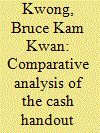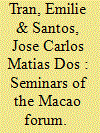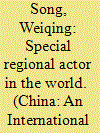| Srl | Item |
| 1 |
ID:
124245


|
|
|
|
|
| Publication |
2013.
|
| Summary/Abstract |
In 2011, Hong Kong SAR government announced an unprecedented policy of cash handouts of 6,000 HKD to all permanent residents at the age of 18 or above as a means of defusing public discontent with economic policy and poor governance. Macau SAR has also been distributing similar cash handouts since 2008 to temper public dissatisfaction and widespread demonstrations. Initially, both SAR governments were very reluctant to initiate universal cash handouts. Unlike standard welfare programmes that are budgeted for annually, the cash payment scheme in Hong Kong SAR was a one-off handout. In Macau SAR, however, the payment scheme went from being a short-term policy to a long-term policy, while other welfare programmes were also allocated more public money. This paper argues that although such cash handout policies are avoidable, they are still being adopted by politicians who place self-interest above the public interest.
|
|
|
|
|
|
|
|
|
|
|
|
|
|
|
|
| 2 |
ID:
080487


|
|
|
|
|
| Publication |
2007.
|
| Summary/Abstract |
Formal politics is defined as political participation under 'rules and institutions' while informal politics is a kind of 'conventions and codes behavior' in the political sphere, such as cronyism and guanxi networks. Both kinds of politics are interacting and functionally inseparable in a political system. This article explores the interactive dynamics between formal and informal politics in the Macao Special Administrative Region (MSAR), with the August 2004 Chief Executive election and the September 2005 Legislative elections as illuminating case studies. It highlights the ways and means with which the Beijing and the MSAR authorities shaped the electoral institutions to undermine political opposition. It argues that formal politics possesses more than window-dressing functions to reveal the 'normal and orthodox form of politics' while the informal type is the real process for decision making. Formal and informal politics undermined the political input of the mass in Macao and triggered political irregularities involving money politics. It concludes that the dynamics of formal and informal politics did not possess enhancement but corruption in forging a genuinely democratic MSAR polity.
|
|
|
|
|
|
|
|
|
|
|
|
|
|
|
|
| 3 |
ID:
138449


|
|
|
|
|
| Summary/Abstract |
This article reviews the role that the Macao Special Administrative Region (SAR) plays in China’s cultural and public diplomacy through training programmes organised by the Macao Forum and tailored for the elite of the world’s Portuguese-speaking countries (PSCs). It begins with a review of China’s approach to key instruments of its soft-power offensive and strategy towards the developing world, followed by an overview of Beijing’s linkages with each PSC. Formulated as an expression of China’s cultural diplomacy towards the PSCs, the seminars of the Macao Forum serve as a kind of cooperation in which the provider party—rather than delivering tangible goods and services such as food, money, loans or infrastructure—actually offers grey matter in the form of ideas for initiatives in public policies and reforms, in order to foster further economic development and administrative rationalisation. Adding to an intense debate and substantial literature that discuss quantitatively and qualitatively China’s role in and aid provision to Africa, the authors argue that China, through the Macao Forum’s training programmes, courts the developing PSCs by building the capacity of their human capital, targeting in particular those in the public and private sectors who are in a position to implement their ideas.
|
|
|
|
|
|
|
|
|
|
|
|
|
|
|
|
| 4 |
ID:
142866


|
|
|
|
|
| Summary/Abstract |
This study examines the diplomatic behaviour of the Macao Special Administrative Region (MSAR) of China, a special substate region, in its external relations. Based on Macao’s experiences, three major diplomatic types have been conceptualised: intrastate diplomacy with mainland China, substate diplomacy as a part of a wider Chinese national polity and quasi-state diplomacy as an autonomous entity in international affairs. Further empirical evidence is drawn from three case studies on the Closer Economic Partnership Agreement, the Sino-Portuguese Economic Forum and the bilateral relations between Macao and the European Union. The diplomatic behaviour of the MSAR is further characterised in terms of its practices, motivations and strategies. The objective of this study is to contribute both conceptually and empirically to a scholarly understanding of diplomacy by a substate region, in the fields of international relations, comparative federalism and China studies.
|
|
|
|
|
|
|
|
|
|
|
|
|
|
|
|